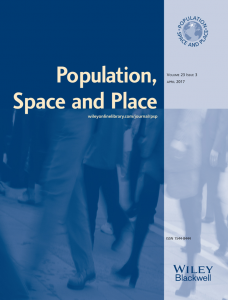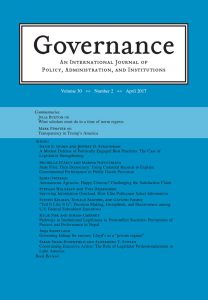Interview with Professor Alison Pullen, Editor-in-Chief of Gender, Work and Organization

Alison Pullen is Professor of Management and Organization Studies at Macquarie University, Australia, and at the time of the interview, Otto Mønsted Visiting Professor at Copenhagen Business School, Department of Organization. Over the course of her career, Alison’s work has been concerned with analyzing and intervening in the politics of work as it concerns gender discrimination, identity politics, and organizational injustice. Alison is joint Editor-in-Chief of Gender, Work and Organization, Associate Editor of Organization and sits on the editorial board of Organization Studies amongst other journals.
Francesca Halstead talks to Alison about her career, current and future projects, and the importance of looking to disciplines like sociology to understand the way people construct the culture around them, and the way corporate cultures influence people’s everyday lives.
What was it that led you to research organization and management studies as a discipline?
I didn’t know what I wanted to do in life, so I did an undergraduate degree in Business Studies, and I hated it! It was very functional, designed to train future generations of managers for typical managerial roles in corporate organizations.
In the last year of my degree however, I studied organization behavior, and started to explore the sociology of work, placing a lot of emphasis on organizational cultures, the dynamics and relationships between people in organizations, and the ways people made sense of their identities within an organization.
Across a range of ontological projects, I became obsessed with thinking through the ways different people’s experience of the work impacts their daily lives. I’ve always been interested in the play between ontology and epistemology, and how people make sense of themselves in the world. During my PhD, organizations in the UK were experiencing profound restructuring and this resulted in massive downsizing and job losses. Many of these organizations were male dominated, Rolls Royce cars for example, and this restructuring was influencing the lives of all men from Director level down to the shop floor. My PhD looked at the ways in which restructuring influenced middle management identity in the organization, and that was the first time that I came across gender studies, especially masculinity studies. I was interested in the restricting effect of corporate organization on men’s lives, and this begged the question, if organizational masculinity was oppressive to men, where did that leave the token woman in these masculine organizations?
I’ve worked in Business Schools because I think people need to understand the effect organizations have on our everyday lives. I’m interested in the ways in which people understand the politics of organization and how people resist oppressive practices they’re faced with. Even when I’m not researching individual’s resistance to organization there is an underlying message of how people can resist, particularly corporate forms of oppression in organization, and we see this manifesting now through discrimination and sexual harassment at work for women.
I employ feminist philosophy and thought to understand issues such as organizational and management hierarchy and control, managerial identity, leadership, and ethics and politics of organization. Within disciplines such as sociology and philosophy are conceptual ideas around resistance, which we can interpret for thinking through the dynamics of organization.
How has the discipline developed over time?
Since Jill Rubery and David Knights started the Gender, Work and Organization journal in 1994, it has always been multidisciplinary. Researchers have always turned to other disciplines to look for ways in which the theoretical and methodological debates were shaping gender issues in organizations, whether that’s work life balance, paid leave, the industrialization of sex workers, or the nature of women’s work. In the past year since becoming editor, the journal has received many psychological studies on gender and sex roles in organizations, as people try to quantify the way sex influences work and organizational issues. We welcome more sociological papers that extend critical, theoretical debates and push the boundaries between disciplinary knowledge in the field.
Personally, I’m committed to publishing more feminist philosophy papers which rethink organizational phenomena from diverse theoretical and philosophical approaches. I’m currently working on developing an ethics of sexual difference in relation to leadership with Associate Professor Sheena Vachhani at The University of Bristol. We draw on Luce Irigaray’s ideas on the ethics of sexual difference, to critique the ways leadership, in thought and practice, reinforces a particular form of feminine leadership which is problematic for women. Women in organizations, particularly women in senior leadership positions, are often judged in relation to male forms of leadership. When women embody and practice leadership in their own way, they’re often labelled and categorized to be ‘feminine’ leaders or ‘female leaders with strong feminine and/or masculine’ qualities. We suggest that this renders women always in relation to the masculine discourse of organization and particularly corporate organization. Philosophy helps us to challenge the commodification and appropriation of woman and the feminine in relation to organization and the masculine. It’s really important for me as an editor that scholars of Gender, Work and Organization continue to look to other disciplines for provocative ideas that we can translate and extend the disciplinary knowledge that we publish.
And what do you see as developing or future trends?
We need to engage the global community, and engage in areas where we haven’t published much before, for example I’d like to see more papers from Japan and South America. I’m interested in looking at alternate forms of organization, and what we can learn from different ways of organizing, whether that’s from online social movements, or the global resistance against perpetrators of women.
We also need to engage more closely with the ways in which gender intersects with race and ethnicity. A recent paper by rashne limki is a post-colonial critique of diversity and difference, and is a fantastic example of provocative theorizing to spark and continue debate. There are also lessons in reinterpreting classic debates, for example Patricia Yancy Martin’s work on feminist organizing takes early debates about feminist sociologist ideology, and ask questions about what it means in a time when we have businessmen as politicians, that are violating the rights of women in terms of health and their bodies.
What are you working on currently?
The last few years I’ve been working with Carl Rhodes on embodied theorizing, and the ways in which people’s experience of organizations are understood through the body. Building on Rosalyn Diprose’s work, corporeal ethics considers that ethics is grounded in the body before the mind. For example, to think ‘I will decide to behave ethically today, in my organization’ means that ethics is something that comes from the body. In contrast, if your child falls in a swimming pool, you don’t think shall I act or not, you just jump in. We engage ethically in a pre-reflective form, and we consider how people’s conduct in organizations might be informed in this context, as well as how we use these ideas to resist oppressive forms of organization.
What does this mean for current issues and organizational practices?
When women are a minority in organizations, they may be unable to form ways of working together, and may get sucked into masculine ways of working. In these instances, they might be reproducing forms of masculine organization, whilst at the same time their work is trying to contest or challenge masculine hegemony. When women work differently they can produce very different organizational outcomes. Recently, in Nordic regions, I have had the pleasure of witnessing women majorities in organizations, and when they develop feminine and productive ways of working together, they present a very serious challenge to male dominated cultures that have previously undermined them. I have been refreshed by these women who have an academic interest in gender and feminism and working differently. Feminism influences their teachings and writings, and the ways in which they live their lives. It is not just a case of challenging masculine forms of organization as women, it’s about creating alternative spaces that foster very different dynamics.
This is like affective solidarity, when women come together on an issue, despite our differences, we unite so that we can challenge patriarchy. For example, the ‘MeToo’ (#MeToo) movement in Sweden is very strong; it’s strong globally but in Sweden it’s significant in that it addresses all industries, with people calling out harassment, calling out discrimination, and working to zero tolerance. Similarly, the ‘Everyday Sexism’ movement shows that through experience and empathy, and the relationship of being with other women speaking out against harassment, political movements do start by women coming together, even in online spaces (see Vachhani and Pullen, forthcoming).
Reference
Vachhani, S. and Pullen, A. (forthcoming) Ethics, politics and feminist organizing: Writing feminist infrapolitics and affective solidarity into everyday sexism. Human Relations.
The following selection of articles from Gender, Work, and Organization are free to read until 31 May 2018
Lisa Adkins, Work in the shadow of finance: Rethinking Joan Acker’s materialist feminist sociology Gender Work Organ. 2018;1–10. DOI: 10.1111/gwao.12227
Bo-Wei Chen, Touching intimacy: Bodywork, affect and the caring ethic in erotic gay massage in Taiwan Gender Work Organ. 2017;1–16. DOI: 10.1111/gwao.12215
Simon Irving and Jenny Helin, A World for Sale? An Ecofeminist Reading of Sustainable Development Discourse Gender Work Organ. 1 August 2017. DOI: 10.1111/gwao.12196
rashne Limki, On the coloniality of work: Commercial surrogacy in India Gender Work Organ. 2017;1–16. DOI: 10.1111/gwao.12220
Banu Ozkazanc-Pan and Susan Clark Muntean, Networking towards (in)equality: Women entrepreneurs in technology Gender Work Organ. 2018;1–22. DOI: 10.1111/gwao.12225



1099-0860/asset/NCB_logo.gif?v=1&s=40edfd0d901b2daf894ae7a3b2371eabd628edef)
1754-9469/asset/society_affiliation_image.gif?v=1&s=9197a1a6ba8c381665ecbf311eae8aca348fe8aa)